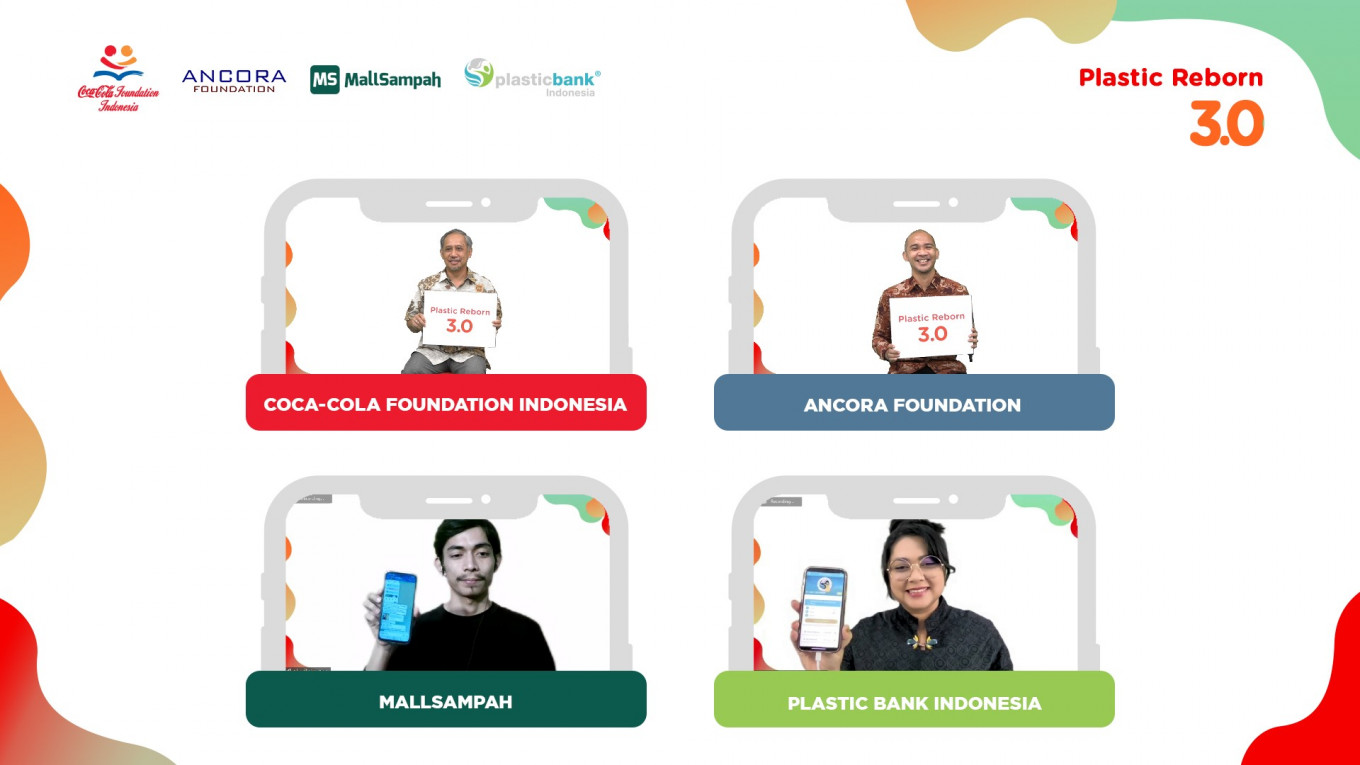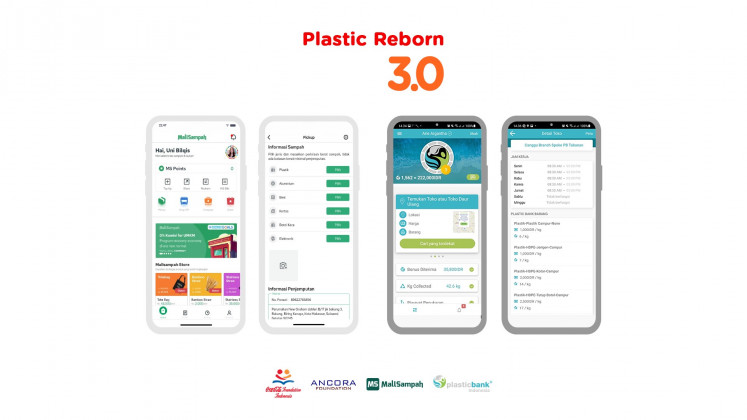Popular Reads
Top Results
Can't find what you're looking for?
View all search resultsPopular Reads
Top Results
Can't find what you're looking for?
View all search resultsPlastic Reborn 3.0 to strengthen waste-management ecosystem in Lombok and Makassar
Change text size
Gift Premium Articles
to Anyone
T
he Coca-Cola Foundation Indonesia (CCFI) with support from The Coca-Cola Foundation has joined hands with Ancora Foundation and implementing partners Plastic Bank Indonesia and MallSampah in a new phase of a program to seek out solutions to tackle the country’s plastic waste problem.
Through the Plastic Reborn 3.0 program, the partnership aims to improve the ecosystem of waste collection by empowering informal collectors.
Plastic Reborn began in March 2017 as a collaborative program initiated by CCFI and the Ancora Foundation to support a circular economy recycling ecosystem in Indonesia. Plastic Reborn 3.0 is funded by The Coca-Cola Foundation, while CCFI monitors the implementation of the grant fund in Indonesia.
In its third phase, Plastic Reborn 3.0 seeks to empower and improve the livelihood of waste workers, namely scavengers and waste collectors, in coastal areas of Indonesia including Lombok and Makassar. This is done through the utilization of technology, such as a collection app for communities and waste collectors to support the recording, tracking and monitoring of recycling data that further increases collection rates.
In the Plastic Reborn 3.0 program, Ancora Foundation together with Plastic Bank Indonesia and MallSampah has collected more than 14 million plastic bottles from the Lombok and Makassar region, equivalent to 293 tons.
Plastic Bank Indonesia and MallSampah have provided intensive training and mentoring to 436 scavengers and waste collectors to accelerate technology adoption in the waste-management sector, improving the existing post-consumption plastic packaging waste-management capabilities.
CCFI chief executive Triyono Prijosoesilo said that the program is a continuation of the effort to drive a robust ecosystem for waste management in Indonesia.
“The Plastic Reborn 3.0 initiative aims to assist scavengers and waste collectors in capacity-building activities through adoption of technology that optimizes collectors’ work and community development programs. This program also encourages an efficient waste and recycling system, especially in coastal areas of Lombok and Makassar, and connects them with much-needed recycling infrastructure,” he explained.
Situated in coastal areas, the island of Lombok and the city of Makassar are extremely vulnerable to environmental pollution, including waste originating from land. At the same time, the handling of waste in both areas is hindered by major obstacles, such as the lack of robust waste infrastructure.
“Learning from previous iterations of the Plastic Reborn initiative, we have identified the use of technology and empowerment of the informal community sector as two of the key components to create a robust ecosystem for the circular economy in Indonesia,” explained Ancora Foundation executive director Ahmad Zakky Habibie.
“The most important is also opening a path for them to connect with recycling infrastructure in their area.”
The combined capabilities of social enterprises Plastic Bank Indonesia and MallSampah as implementing partners of the Plastic Reborn 3.0 program offer transparency, monitoring, capacity building and adoption of technology solutions to build a comprehensive waste-management system.
With the aid of technology, waste collectors are now able to monitor the data of schedule, transaction, amount, frequency of selling-buying transactions, as well as deposited post-consumption bottles. The addition of these roles and collaborative efforts is expected to positively impact the welfare of scavengers and people involved in the program.
. (Courtesy of Coca-Cola Foundation Indonesia/.)
Speaking about the Plastic Reborn 3.0 program, Plastic Bank Indonesia Country Manager Paola Cortese said that they are thrilled to be part of this initiative as it is in line with Plastic Bank Indonesia’s mission to help the world stop ocean-bound plastic while improving the lives of collector communities.
“With Plastic Reborn 3.0, we are using business as a force for good to make our collectors recycling-literate across eight waste collection points in Lombok and the surrounding areas. We also provide financial inclusion, transparency, and traceability through Alchemy™ - our blockchain platform while measuring the environmental, social and economic impact,” she said.
CEO and founder of MallSampah Adi Saifullah Putra also expressed his enthusiasm for being reselected to participate in the Plastic Reborn program.
“We have equipped our scavengers and waste collector partners with an app that can help expedite the waste-collection process. With the app, they get to choose which order to take and can record their activities, sales and income within the system. The app also integrates electronic payment including a top-up system for collectors,” he explained, adding that the app also connected buyers with recyclers as well.
“Through this initiative, we aim to promote transparency and traceability in the recycling process, both of which are in line with our mission to digitize the informal sector.”
Sri Wahyuni, a waste collector from Lombok and Plastic Reborn 3.0 participant also shared the benefits she has reaped from the program.
“Through this program I have received invaluable assistance and new insights especially in how to improve waste collection,” she said.
After using the Plastic Bank app, Sri also received the opportunity to improve her life and experienced financial inclusion through the ability to convert plastic to rice, tuition fees for her children, as well as obtaining health insurance for her entire family.
“We hope that in the future the community is able to independently run the Plastic Reborn 3.0 program. This is a ‘gate’ for workers in the informal sector to connect with a sustainable circular economy by harnessing newly acquired technologies and skills. Turning waste into a high-value resource, we have the potential to provide economic, social, and environmental benefits for Indonesia," Triyono concluded.











